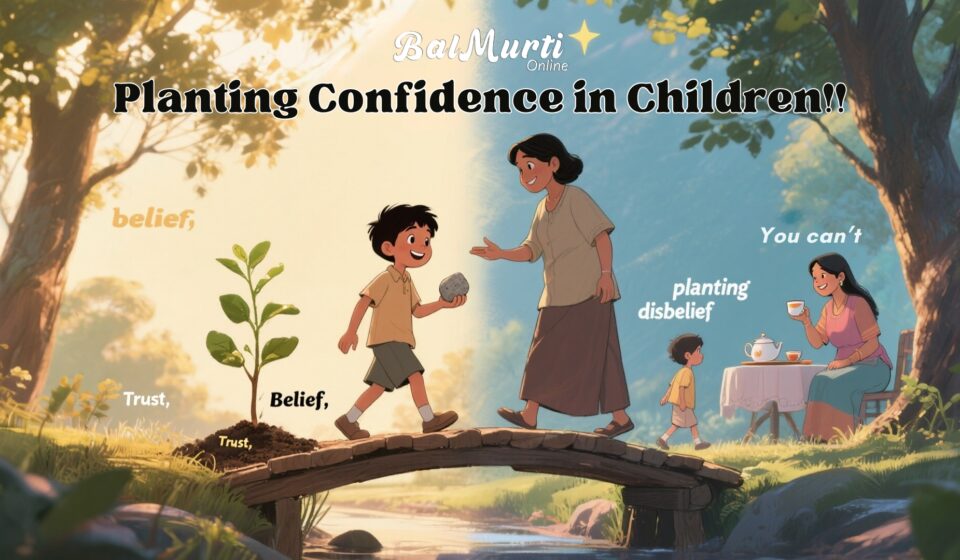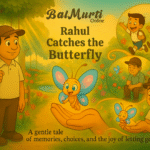
Planting Confidence in a Child

A little boy walks up to his mother with a determination shining in his eyes. In his tiny hands, he carries a hot cup of tea. He’s proud, focused, and eager to help.
But before he can reach her, she says firmly, “Put it down. You can’t handle it.” The child’s face falters.

He learns to climb the stairs, slowly and carefully, and makes it to the second step. Just as he’s about to reach the third, his father yells, “Come down! You’re not strong enough yet. You’ll fall and break your bones.”
Again, the spark dims a little.
He tries to sharpen a pencil with a blade, concentrating with all his might, mimicking how his father does it. But instead of encouragement, he hears, “Put that down! Are you the priest now? That’s not your job.”
He watches someone jump over a ditch and says excitedly, “I can jump too!” A voice from the house immediately shouts, “Be careful! Don’t land on a snake!”
He wants to open the door when it sticks. “Let me try!” he says. Everyone laughs: “What can you do? You probably can’t even drink buttermilk properly!”
Whenever grown-ups are trying to solve a problem and he comes forward with a suggestion, someone mutters,
“Here comes the donkey to teach the potter!”

A little girl offers to cook rice. “You’ll spill it all,” her grandmother replies. She offers to help with the lentils. “You’ll burn yourself.”
And this… this is how disbelief is planted. Not in one day. Not in one sentence. But in a hundred small moments. Moments when the child was ready to try, and we said NO.
There are times in a child’s life when they are deeply eager to learn.
They don’t care about the mess, the mistakes, or even the risk. They just want to do, to try, to grow, to prove to themselves that they can. Their curiosity is pure. Their focus, intense.
And during those times, they are more careful than ever. More alert. More precise. They want to succeed because they know they’re being watched.
Each time we say “No, not you,” Each time we say “You won’t be able to,” We chip away at their self-belief.
Eventually, it crumbles. They stop trying. They stop asking.
They don’t believe in themselves, not because they were born incapable, but because someone they loved told them they were.

Let me tell you about a boy named Chandu.
One day, I asked him to walk with me across a shallow bridge.
He hesitated.
“I can’t cross. I’ll drown.”
“Who told you that?” I asked.
“My grandmother,” he replied.
I asked him to bring me a stone.
“I can’t lift it.”
“How do you know?”
“Because my mother says I can’t.”
So I said, “Well, I believe you can. Let’s do it together.”

We tried. And he did it.
Then he smiled. Not at me, but at himself.
It was the smile of a boy who had just met his own potential.
From that day, Chandu changed. He walked taller. Tried harder. Trusted himself more. All it took was one person who said, “I believe in you.”
So, what are we really doing when we say ‘You can’t’ to a child?
We are injecting disbelief into their spirit. And often, it’s not their doubt. It’s our own fear, our own lack of trust that we project onto them.

We forget: a child may be small, but they are a full human. They have courage, will, instinct, and an incredible ability to grow. What they don’t have, yet, is someone who believes in them enough to let them try, fail, and rise again.
We must give our children chances to lift, to climb, to spill, to burn slightly, to try foolish things…
Because in those trials, confidence is born.
Plant the seed of belief today. And tomorrow, you will watch them bloom, not just into someone who can, but into someone who knows they can.
Disclaimer:
This article reflects the author’s personal insights and reflections. It is shared with the intention of encouraging thoughtful parenting and generational harmony. The project and foundation are acknowledged as part of the original source for transparency and integrity.




